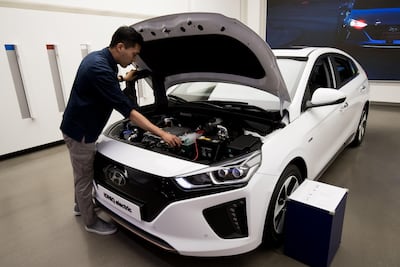Nissan reported first-quarter earnings that trailed analysts’ estimates as its vehicles failed to attract buyers in the US and Japan.
Operating profit fell 29 per cent to ¥109.1 billion (Dh3.62bn) in the three months through June, the car maker said on Thursday. Analysts predicted ¥110.8bn, the average of estimates compiled by Bloomberg.
Nissan adds to a growing list of downbeat reports from car makers, with General Motors, Ford Motor and Fiat Chrysler Automobiles all reducing profit forecasts this week amid global trade tensions. Already dealing with sputtering demand in the US, Nissan faces an uncertain future in which US President Donald Trump is considering tariffs on imported cars and parts.
_______________
Read more:
Nissan GT-R celebrates 50th anniversary with striking special edition – in pictures
A car fit for Tony Stark: meet the Iron Man SUV – in pictures
_______________
The Japanese car maker’s increased focus on China is providing some shield, helped by rising demand for models such as the Sylphy compact saloon and the X-Trail 4x4. A slumping yen is also a boon, boosting the value of earnings repatriated from markets such as the US. The currency declined about 4 per cent against the dollar during the quarter.
Hyundai , meanwhile, also said on Thursday its net profit for the second quarter fell - 14 per cent - over a year earlier due to the South Korean won's strength against the US dollar, AP reported.
South Korea's largest car maker said its April-June net income was 701bn won (Dh2.29bn), compared with 817bn won a year earlier.
It was lower than the analyst consensus of 897bn won, according to financial data provider FactSet.
Sales inched up 2 per cent over a year earlier to 24.7 trillion won but operating profit sank 29 per cent to 951bn won.
Hyundai Motors's profit fell despite it having sold more vehicles. That is because its overseas profit repatriated to South Korea shrank due to the cheaper US dollar.
In April-June, car sales rose 11 per cent over a year earlier to 1.2 million units. For the first half of this year, sales rose 4.5 per cent to 2.2 million units.
In the US market, Hyundai's car sales fell sharply during the first six months of this year as new 4x4 models such as the Kona did not help sales until May, while demand for Hyundai's flagship saloons stayed weak. Sales in South Korea were helped by new 4x4 models.
Hyundai's sales revived after sinking in China last year due to a diplomatic row over South Korea's deployment of a US missile defence system. But Hyundai uncertainties related to the THAAD missile system remain since Chinese consumers have shunned Korean products.
Going forward, Hyundai cited global trade tensions as a troubling source of uncertainty that could dent auto demand, if prolonged. If the US government imposes tariffs on foreign-made cars or components, car prices for consumers will jump, hurting the industry, Hyundai said.


